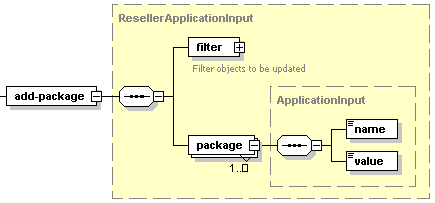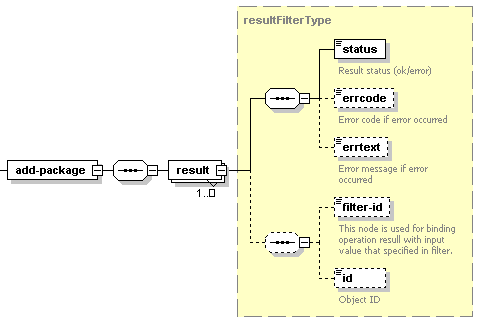Including an App in a Reseller Account
The add-package operation is used to include certain apps in reseller accounts. In turn, reseller can include these apps in service plans.
Request Packet Structure
A request XML packet including a new app to a reseller account includes the add-package operation node:
<packet>
<reseller>
<add-package>
...
</add-package>
</reseller>
</packet>
The add-package node is presented by the ResellerApplicationInput
type (reseller.xsd). Its graphical representation is as follows:

Note: The interactive schema navigator for all request packets is available here: http://plesk.github.io/api-schemas/1.6.9.1/agent_input.svg.
- The filter node is required. It specifies the filtering rule. Data type: ResellerSelectionFilter. For more information on filters, refer to the Available Filters section.
- The package node is required. It specifies what type of
information about the added package is requested. Data type:
ApplicationInput (
plesk_common.xsd). - The name node is required. It specifies the name of the application that will be added to the reseller account. Data type: string.
- The value node is required. It specifies the value of the application that will be added to the reseller account. Data type: string.
Note: When creating request packets, put nodes and elements in the order they follow in the packet structure.
Response Packet Structure
The add-package node of the response packet is structured as follows:

Note: The interactive schema navigator for all response packets is available here: http://plesk.github.io/api-schemas/1.6.9.1/agent_output.svg.
- The result node is required. It wraps the response got from the
server. Data type: resultFilterType (
common.xsd). - The status node is required. Specifies the execution status of the operation. Data type: string. Allowed values: ok | error.
- The errcode node is optional. Returns the error code when the operation fails. Data type: unsignedInt.
- The errtext node is optional. Returns the error message if the operation fails. Data type: string.
- The filter-id node is optional. Returns the parameter by which the reseller account was filtered by in the request packet. Data type: anySimple.
- The id node is optional. Returns the identifier of the reseller
account to which the application was added. Data type: id_type
(
common.xsd).
Including WordPress to a reseller account
A packet that includes an app package WordPress to the reseller account with ID 1234 looks as follows:
<packet>
<reseller>
<add-package>
<filter>
<id>1234</id>
</filter>
<package>
<name>name</name>
<value>WordPress</value>
</package>
</add-package>
</reseller>
</packet>
Response:
<packet>
<reseller>
<add-package>
<result>
<status>ok</status>
<filter-id>1234</filter-id>
<id>1234</id>
</result>
</add-package>
</reseller>
</packet>